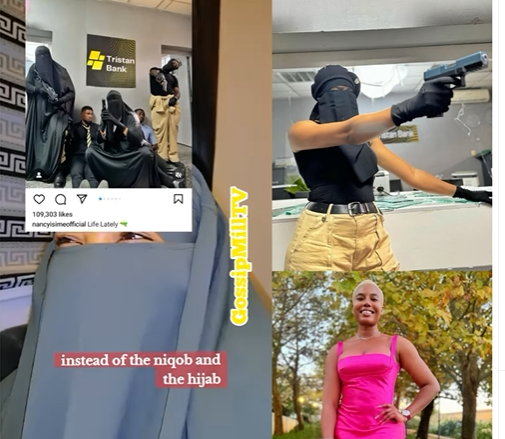Lifestyle
Censors Board Gives New Directives On Film Actresses Play Armed Robbers In Islamic Robe

The National Film and Video Censors Board (NFVCB) has said that it has taken steps to address concerns that erupted from from the yet-to-be-released film where Nollywood actress, Nancy Isime and other actresses were seen robbing a bank in niqab.
After the movie advert went viral on Social media, some sections of the Muslim community in Nigeria were enraged and openly criticised the actresses.
The Muslim Rights Concern (MURIC) had also called on the NFVCB to ban the controversial film, which it described as “satanic”.
Reacting to the calls in a statement, NFVCB disclosed that the film is still in production and has not been submitted for classification.
The board said the film producers are “working to address the issues raised by the public”.
The NFBCB added that it will not overlook creative works “that abuse, denigrate, or undermine religious, cultural and ethnic sensibilities”.
The statement released by the board reads: “The National Film and Video Censors Board (NFVCB), the statutory regulatory agency for film and video works as well as exhibition and distribution in Nigeria, has received complaints about an upcoming Nigerian movie that associated the Hijab, an outfit attributed to Muslim women that symbolizes respect, modesty and religious devotion, with negative moral vices.
“Our check revealed that the movie has not been released, and it has not been submitted to the NFVCB for classification as required by law and our mandate.
“However, we have been able to reach the producers of the film and have taken steps to address the concerns raised with the producers.”
The statement added, “We restate that as a classification agency, the NFVCB will not overlook any film or video works, including dramatized short contents (skits) that abuse, denigrate, or undermine religious, cultural, and ethnic sensibilities.
“We commit to contributing to the positive transformation of the Nigerian society through classification of films and video works whilst balancing the need to preserve freedom of expression within the law, and limit social, cultural and religious harm caused by films.”
Send Us A Press Statement Advertise With Us Contact Us
And For More Nigerian News Visit GWG.NG